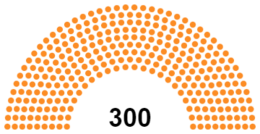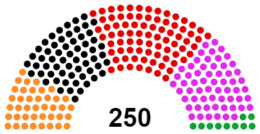Central Governing Council
Central Governing Council Chūō Tōchihyōgikai | |
|---|---|
| Unicamerial | |
| Type | |
Term limits | N/A |
| History | |
| Preceded by | State Unity Congress |
| Leadership | |
Paramount Leader | |
Head of the CGC | |
| Structure | |
| Seats | 300 (250 Elected, 50 Appointed) |
 | |
Political groups | National Development Party |
 | |
Political groups | Beomist Coalitition Non-Supporting Factions |
| Elections | |
| Direct Election | |
Last election | February 12th, 2030 |
Next election | February 12th, 2036 |
| Meeting place | |
| Central Governing Structure, Omiskan | |
The Central Governing Council is the primary legislature of Neo-Korea, comprised of 250 elected seats and 50 appointed seats. It is Unicamerial in nature, a trait it incorporated from the short lived State Unity Congress formed by Hikaru Sakuma. The power of the CGC has historically waned and waxed based on the capacity of the Paramount Leader to exert power and their willingness to accept advice, but it has consistently possessed the power to draft and recommend legislature to the Paramount Leader, alongside possessing the hypothetical power to appoint or remove the Paramount Leader with a 4/5ths majority vote.
The composition and powers of the CGC were laid out by Hikaru Sakuma's First Document On State Affairs, which set out the advisory role of the CGC, and defacto legalized the role factionalism had already begun to play - alongside establishing a group of 50 indiivudals appointed by elements of the state aligned with his own position, such as the Neo-Korean Ground Forces or the Central Intelligence Services. It is headed by Muraoka Shig.
History
See Also: History of Democracy on the Nán Yánshēn
The first modern major Kāichrén legislative system was the unofficial State of Kaesong's National Advisory Council organized by Hamamoto Jaeon. The National Advisory Council contained a number of figures notable for their public appeal and connection with other civilian figures within the state, who had been gathered by Jaeon to provide policy and governmental advice - with these figures informing his domestic and foreign policy. Later in his regime, these figures would be formalized into an official (although still not directly popularly elected) council, appointed by the governors of provincial areas (who were directly elected) via secret ballot.
In the wake of the Second Kāichrén Revolution the structure of this body, alongside the Chimamire-only elections of the Sabi Republic, would be consulted for the purposes of forming an electoral system. Suffrage was extended to all members of the state in good standing (which entailed not being religiously aligned and regularly contributing to communal affairs, a matter judged by state-appointed bureaucrats in each community), with those in good standing having the right to directly vote on the election of local figures and being allowed to engage in party-list voting for nationwide elections. Elections would cease to be convention rapidly during the existence of the KDR, owing to the start of the Great War and the democratic backslinding (and eventual abolishment) which occurred due to such.
During the duration of the Kāichrén Civil War, a number of states would iterate on the organization of democratic systems, including Hikaru Sakuma's statelet during the period - which organized the State Unity Congress in a similar advisory role to Hamamoto's own NAC. The State Unity Congress would be rapidly modified following the end of the KCW, under the direction of his allies Nitta Michi and Fukuda Chiasa, who despite their personal differences agreed that the SUC's increasing factionalism necessitated it being reformed into a primarily advisory body. This reform would come with the establishment of the CGC in 1962, which overturned the existence of the SUC to some internal debate, despite the issues which had been found with it by a vaugely unified block of the National Development Party.
In the modern era, the CGC has generally continued to exert these powers, excluding the period from 1986-1995 wherein its leaders also fulfilled the role of state leadership.
Composition
250 members of the CGC are directly elected via a system wherein multiple candidates of differing factions under the NDP umbrella run for the right to be selected as the candidate for that region in the months leading up to the primary, more official election. The remaining 50 seats are filled with either direct appointments by the Paramount Leader, appointed figures from autonomous regions, or appointed figures from ministries of note. Anyone aged 20 or above may vote via secret ballot in the elections for whichever region they live within. Candidates must be 20 or older, possessing the same restriction as general voters, and candidates must be members of the National Development Party.
Members of the CGC are assisted by three state-appointed secretaries, Class-A apartments, and usually also receive some level of private air transport.
Powers
The powers of the CGC are, on an official-only level, the ability to recommend policy to the Paramount Leader, to have such considered, and to appoint or remove a Paramount Leader by 4/5ths majority in the event they are declared, on a medical and official level, unfit to remain within office. This narrow list does not truly represent the powers the CGC have, owing to their connection to the fundamental powers of the National Development Party and the level of economic and political influence they are able to mobilize through such. During the period where control of the role of the Head of State was possessed by the Head of the CGC, the CGC itself possessed far greater power than normal, both due to obvious reasons of influence but also because they could remove the Head in a simple 1/3rds vote, which allowed them to have notable influence over state affairs.
Additional to these powers, the CGC possesses the right to internally censure its members in the event of certain incidents occurring, being able to investigate and charge (or acquit) a member without the need for a three-man troika, a means usually utilized in judicial matters.
Officers
Factional Secretary
The Factional Secretary is the appointed head of a Faction's grouping in the CGC, who organizes discussions with other Secretaries and determines how the party will vote on certain matters, enforcing discipline and also allowing for the party to have a head who can focus on CGC matters while leaving other members of such to focus on election organization or planning for government roles.
Procedure
A meeting of the CGC is to be held every three months - starting from six days after their initial election, or February 18th. These meetings take place over the course of an approximate three-to-four weeks, and are used to discuss policy and proposals, which can be drafted by either members of the CGC or members of the cabinet, which are to be sent to the Paramount Leader for approval - a process which requires a 1/3rd vote. Meetings are begun by an speech by the Head of the CGC, and ended by the same means.
Meetings can be convened irregularly via 2/3rds vote of the CGC.